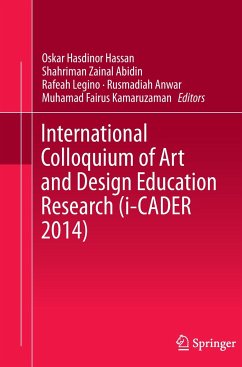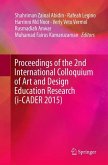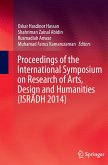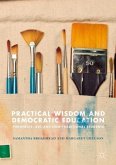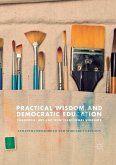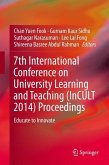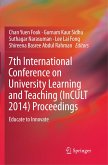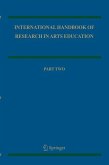International Colloquium of Art and Design Education Research (i-CADER 2014)
Herausgegeben:Hassan, Oskar Hasdinor; Abidin, Shahriman Zainal; Legino, Rafeah; Anwar, Rusmadiah; Kamaruzaman, Muhamad Fairus
International Colloquium of Art and Design Education Research (i-CADER 2014)
Herausgegeben:Hassan, Oskar Hasdinor; Abidin, Shahriman Zainal; Legino, Rafeah; Anwar, Rusmadiah; Kamaruzaman, Muhamad Fairus
- Broschiertes Buch
- Merkliste
- Auf die Merkliste
- Bewerten Bewerten
- Teilen
- Produkt teilen
- Produkterinnerung
- Produkterinnerung
This book focuses on Art and Design Education Research. Gathering 72 papers illustrated with diagrams and tables, they provide state-of-the-art information on infrastructure and sustainable issues in Art and Design, focusing on Design Industrial Applications, Visual Communication and New Media, Art Education Research, Cultural Studies, and the Social Implications of Art. They also offer detailed information on innovative research trends in Design Technology and Multimedia Design, as well as a compilation of interdisciplinary findings combining the Humanities and Quality of Life in Art and Design.…mehr
Andere Kunden interessierten sich auch für
![Proceedings of the 2nd International Colloquium of Art and Design Education Research (i-CADER 2015) Proceedings of the 2nd International Colloquium of Art and Design Education Research (i-CADER 2015)]() Proceedings of the 2nd International Colloquium of Art and Design Education Research (i-CADER 2015)162,99 €
Proceedings of the 2nd International Colloquium of Art and Design Education Research (i-CADER 2015)162,99 €![Proceedings of the International Symposium on Research of Arts, Design and Humanities (ISRADH 2014) Proceedings of the International Symposium on Research of Arts, Design and Humanities (ISRADH 2014)]() Proceedings of the International Symposium on Research of Arts, Design and Humanities (ISRADH 2014)121,99 €
Proceedings of the International Symposium on Research of Arts, Design and Humanities (ISRADH 2014)121,99 €![Practical Wisdom and Democratic Education Practical Wisdom and Democratic Education]() Samantha BroadheadPractical Wisdom and Democratic Education73,99 €
Samantha BroadheadPractical Wisdom and Democratic Education73,99 €![Practical Wisdom and Democratic Education Practical Wisdom and Democratic Education]() Samantha BroadheadPractical Wisdom and Democratic Education73,99 €
Samantha BroadheadPractical Wisdom and Democratic Education73,99 €![7th International Conference on University Learning and Teaching (InCULT 2014) Proceedings 7th International Conference on University Learning and Teaching (InCULT 2014) Proceedings]() 7th International Conference on University Learning and Teaching (InCULT 2014) Proceedings162,99 €
7th International Conference on University Learning and Teaching (InCULT 2014) Proceedings162,99 €![7th International Conference on University Learning and Teaching (InCULT 2014) Proceedings 7th International Conference on University Learning and Teaching (InCULT 2014) Proceedings]() 7th International Conference on University Learning and Teaching (InCULT 2014) Proceedings162,99 €
7th International Conference on University Learning and Teaching (InCULT 2014) Proceedings162,99 €![International Handbook of Research in Arts Education International Handbook of Research in Arts Education]() Liora Bresler (ed.)International Handbook of Research in Arts Education415,99 €
Liora Bresler (ed.)International Handbook of Research in Arts Education415,99 €-
-
-
This book focuses on Art and Design Education Research. Gathering 72 papers illustrated with diagrams and tables, they provide state-of-the-art information on infrastructure and sustainable issues in Art and Design, focusing on Design Industrial Applications, Visual Communication and New Media, Art Education Research, Cultural Studies, and the Social Implications of Art. They also offer detailed information on innovative research trends in Design Technology and Multimedia Design, as well as a compilation of interdisciplinary findings combining the Humanities and Quality of Life in Art and Design.
Produktdetails
- Produktdetails
- Verlag: Springer / Springer Nature Singapore / Springer, Berlin
- Artikelnr. des Verlages: 978-981-10-1229-7
- Softcover reprint of the original 1st ed. 2016
- Seitenzahl: 732
- Erscheinungstermin: 23. August 2016
- Englisch
- Abmessung: 235mm x 155mm x 40mm
- Gewicht: 1104g
- ISBN-13: 9789811012297
- ISBN-10: 9811012296
- Artikelnr.: 48938276
- Herstellerkennzeichnung Die Herstellerinformationen sind derzeit nicht verfügbar.
- Verlag: Springer / Springer Nature Singapore / Springer, Berlin
- Artikelnr. des Verlages: 978-981-10-1229-7
- Softcover reprint of the original 1st ed. 2016
- Seitenzahl: 732
- Erscheinungstermin: 23. August 2016
- Englisch
- Abmessung: 235mm x 155mm x 40mm
- Gewicht: 1104g
- ISBN-13: 9789811012297
- ISBN-10: 9811012296
- Artikelnr.: 48938276
- Herstellerkennzeichnung Die Herstellerinformationen sind derzeit nicht verfügbar.
Oskar Hasdinor Hassan is currently a teaching staff in the Faculty of Art and Design, Universiti Teknologi MARA (UiTM), Malaysia. He specializes in ceramic materials and processing for undergraduate students. He was in Jülich Research Centre, Germany, as a visiting scientist working on the Solid Oxide Fuel Cells (SOFCs) project which was also part of his PhD research work at Ruhr Universität Bochum. His research interests are focused on ceramic and manufacturing problems that involve design as a bridge between the two distinct discipline of engineering and design. Much of Oskar's recent research has been published in more than 30 papers, indexed in ISI/Scopus. He also chairs several international conferences under the sponsorship of IEEE Malaysia. Shahriman Zainal Abidin is an Industrial Designer graduate and currently a teaching staff in Faculty of Art and Design, UiTM. His teaching interests and experience are in the areas of design methodology, industrial design research and interaction design and automotive design. He received his PhD from the Norwegian University of Science and Technology in the field of Formgiving. His expertise resonates around the field of Formgiving research in automotive. Currently he is seconded to the Department of Research and Development in Proton Holdings Bhd., a Malaysia Automotive Company. He is in charge with creating the new Proton DNA design of the national car. Rafeah Legino is a Senior Lecturer and also an artist in the Faculty of Art and Design, UiTM. Her work focuses on print media, which includes collograph, monoprint and marbling. Most of her artwork highlights her fondness for creating work that addresses subjects concerning the natural environment and cultural heritage. Recently, she's graduated from School of Art, RMIT University, Australia with a PhD (Fine Art) by research project. Her interests and experiences are in the areas of Malaysian and Asian visual arts, comprising crafts and visual art heritage which can also be traced in her researches, consultancies, exhibitions and paper publications from 1997 onwards. Rusmadiah Anwar is a lecturer of Faculty of Art & Design, UiTM. He became an Associate Member of Institute of Electrical and Electronics Engineers (IEEE) Malaysia and Collective Member (University) for the International Academy of Ceramics, Geneva (NGO official partner of UNESCO) since 2011. He is a research member of the Formgiving Design Research Initiative Group, UiTM and is currently an active researcher focusing on Practiced-Based Design and Laboratory Based Design Method in investigating design and human behaviour. He has published his research in many conferences locally and internationally and most of these publications are indexed. He is also currently engaged in professional ventures as a member in Technical Committee on Ceramic Materials & Sanitary Fittings for SIRIM Bhd and Technical Program Committee for several of IEEE conferences. Muhamad Fairus Kamaruzaman is a research fellow in Formgiving Design Research Initiative Group in UiTM. As a senior lecturer he is actively engaged in researching the fields of Assistive Design Technology, Mobile Learning, Human Behaviour and the impact of the designed environment on quality of life. He has published more than 25 papers, of which many are indexed publications. He is also a member of the Institute of Electrical and Electronics Engineers (IEEE), Malaysia Design Council and has been appointed as publication Chair and technical committee for various IEEE conferences.
Chapter 1: Structured Planning as a Front-end Process for Concept Design and Development.- Chapter 2: Traditional Keris Pandai Saras Design.- Chapter 3: Innovation Culture: An Evaluation of Academicians in Universiti Teknologi MARA Branch Campuses.- Chapter 4: Microscopic Image and Text Examination of Conventional and Digital Print-outs.- Chapter 5: Theoretical Framework Study on Formgiving Mobile Education Game Design Technology.- Chapter 6: Anthropomorphism in Political Cartoon: Case Study of the 1965 Malaysia- Indonesia Confrontation.- Chapter 7: Developers View: Understanding the Importance of the Courseware Interfaces as Part of the Software Development Process.- Chapter 8: A Randomized Pilot Study to Determine the Effectiveness of Assistive Technology Based Dynamic Visual in Cognition Stimulation Towards Alzheimer's Patients.- Chapter 9: Socioeconomic and Political Implications for Ethnic and National Sentiments: The Impact on Nation-Building Policy Efforts.- Chapter 10: The Effectiveness of Visual Rhetoric in Public Awareness Prints Advertising as A Social Culture Space in Malaysia.- Chapter 11: A Recognizable Symbol of Wedding Ring as a Communication Object to Portray Marital Status.- Chapter 12: 'Gasing' as a Commercialize Games Product in Malaysia.- Chapter 13: Rivet in Ceramic: Method of Past and Present Restoration.- Chapter 14: Comparison of Natural and Synthetic Adhesives for Ceramic Conservation.- Chapter 15: Interrater Agreement for Process Loss Measures: Are They Applicable for Brainstorming Technique in Industrial Design Practices?.- Chapter 16: Stoneware Clay as a Replacement Material for Artificial Reef Design.- Chapter 17: The Exploration Methods of Consistent Raku Firing Glaze Effect Framework.- Chapter 18: Photo Exemplars Classification: The Integration Photographic History Into Photographic Technique.- Chapter 19: Construction of Design: A Formal Proposition of Graphics Analysis of Comics.- Chapter 20: Empirical Study on Game-based Learning Phenomenon Through Mobile Design Technology.- Chapter 21: The Concept of Formgiving for Color and Trim in Car Design.- Chapter 22: Unity through Arts: An Approach for Harmony among Children in Malaysia in Achieving the Concept of One Malaysia.- Chapter 23: 'Kuih Putu' Mould as a Matrix for Alternative Printmaking: Transformation Towards an Artistic Interpretation.- Chapter 24: The Study of Proverbs as A Way to Enhance Ethical Values in Artwork.- Chapter 25: A Game-based Learning: A Study on Wau Among Selected University Students in Klang Valley, Malaysia.- Chapter 26: Role of Mobile Web-Based Technology Towards Online Grocery Shopping in Malaysia.- Chapter 27: A Comparative Study of the Appreciation of Local Malaysian Culture in the Artworks of Ilse Noor and Tina Rimmer.- Chapter 28: Preservation Characteristics of Malay Garden: A Catalyst for Sustainable Cultural Landscape in Malaysia.- Chapter 29: The Exploration Technique of Nature for Contemporary Batik Design.- Chapter 30: Promoting the Culture of Philanthropy in Malaysia.- Chapter 31: Elaborating Context from the Content Making Framework.- Chapter 32: Visual Advertisement Images in the Wanita Magazine; an Empirical Study Towards Women Stereotype.- Chapter 33: A Blended Method for Generating Creative Product Concepts.- Chapter 34: Symmetrical Pattern: Analysing Songket in Wallpaper Patterns.- Chapter 35: Conceptual Labyrinth Pattern Design for Ceramic Stoneware Art Form.- Chapter 36: SCAMPER for Character Design Unique Zoo Creature.- Chapter 37: Framework Muwajjah as an Islamic Art Decoration Through Formgiving Process.- Chapter 38: Furniture Design Identity Implementation of National Identity Into Office Chair Design.- Chapter 39: Designing Conceptual 3D Tessellation Ceramic Optical Illusions.- Chapter 40: Paper Clay Study Development for Ceramic Art Form Design.- Chapter 41: Corn Husk Fiber in Songket Weaving for Cottage Industry.- Chapter 42: Luminescence Glaze as Third Decoration on Ceramic Surface.- Chapter 43: A Reference to Usability Inspection Methods.- Chapter 44: From Subjectivity to Objective Evaluation: A Techno-Rationalist Approach of Assessment Design for Art & Design Education.- Chapter 45: Correlation Cognition Behaviour and Design in Influencing Ablution Tub.- Chapter 46: Enhancement on Visual Communication for Preschool Education Using Transmedia Approach.- Chapter 47: Acculturation of Peranakan Chinese Into Malay Culture in Terengganu: Influenced to the Development of Malaysian Modern Art.- Chapter 48: The Potential of Photo Manipulation as Visualization Technique in Advertising Campaign.- Chapter 49: Developing Sarawak Motifs Elements of Ventilation Pattern Through Ceramic Stoneware Materials.- Chapter 50: Perception of Readers Towards the Crime Photographs from the Mainstream Malaysian Newspaper in Kuala Terengganu.- Chapter 51: Classification of Frieze Patterns in Malay Songket Textile.- Chapter 52: Mengkuang Pattern of Plaiting as an Aesthetic Design in Kedah.- Chapter 53: Social Media and Cyber Crime in Malaysia.- Chapter 54: Bamboo Modular System (BMS) for New Eco Architecture.- Chapter 55: Investigating Feasibility of Mobile Learning (M-Learning) for History Lesson.- Chapter 56: An Overview of Book Printing and Publishing Industry in Malaysia.- Chapter 57: The Use of Infographics as a Tool for Facilitating Learning.- Chapter 58: Measuring Organisational Culture Performance: The Preliminary Model.- Chapter 59: To Innovate the Potential Used of Arc and Oxy-Acetylene Welding Tools as an Alternative Technique to the Expensive Foundry Works in Creating Metal Casting Sculpture.- Chapter 60: The Behaviour Patterns Towards Printed Colour Medium for Students with Hearing Disabilities.- Chapter 61: Vision 2020 Banknotes Revisited: A Semiotic Analysis of the Third Series Malaysian Banknotes.- Chapter 62: Symmetry in Malaysian Paintings: A Compositional Analysis.- Chapter 63: Graphic Elements in the Portuguese Cartography of Malacca.- Chapter 64:Preventing Childhood Obesity Through Poster Design.- Chapter 65: Design of Prayer Room in Shopping Mall: A Feasibility Study.- Chapter 66: An Innovation of Traditional Malay Singgora Roof Tiles in Modern Architecture.- Chapter 67: A Hybrid Model of Drawing: Pictorial Representation of Visuospatial Attention Through an Eye Tracking Research and Numerical Logic of Lines.- Chapter 68: Design as an Innovative Solution to Promote Impulsive Blood Donation Activity.- Chapter 69: Visual Art Approach to Promoting Malaysia's Art and Cultural Heritage Overseas.- Chapter 70: A Framework of Empirical Study Through Design Practice for Industrial Ceramic Sanitary Ware Design.- Chapter 71: Symmetrical Motifs Design in Malaysian Batik Sarongs Patterns.- Chapter 72: Folding Paper Technique Incorporation in Plaster Modelling.
Chapter 1: Structured Planning as a Front-end Process for Concept Design and Development.- Chapter 2: Traditional Keris Pandai Saras Design.- Chapter 3: Innovation Culture: An Evaluation of Academicians in Universiti Teknologi MARA Branch Campuses.- Chapter 4: Microscopic Image and Text Examination of Conventional and Digital Print-outs.- Chapter 5: Theoretical Framework Study on Formgiving Mobile Education Game Design Technology.- Chapter 6: Anthropomorphism in Political Cartoon: Case Study of the 1965 Malaysia- Indonesia Confrontation.- Chapter 7: Developers View: Understanding the Importance of the Courseware Interfaces as Part of the Software Development Process.- Chapter 8: A Randomized Pilot Study to Determine the Effectiveness of Assistive Technology Based Dynamic Visual in Cognition Stimulation Towards Alzheimer's Patients.- Chapter 9: Socioeconomic and Political Implications for Ethnic and National Sentiments: The Impact on Nation-Building Policy Efforts.- Chapter 10: The Effectiveness of Visual Rhetoric in Public Awareness Prints Advertising as A Social Culture Space in Malaysia.- Chapter 11: A Recognizable Symbol of Wedding Ring as a Communication Object to Portray Marital Status.- Chapter 12: 'Gasing' as a Commercialize Games Product in Malaysia.- Chapter 13: Rivet in Ceramic: Method of Past and Present Restoration.- Chapter 14: Comparison of Natural and Synthetic Adhesives for Ceramic Conservation.- Chapter 15: Interrater Agreement for Process Loss Measures: Are They Applicable for Brainstorming Technique in Industrial Design Practices?.- Chapter 16: Stoneware Clay as a Replacement Material for Artificial Reef Design.- Chapter 17: The Exploration Methods of Consistent Raku Firing Glaze Effect Framework.- Chapter 18: Photo Exemplars Classification: The Integration Photographic History Into Photographic Technique.- Chapter 19: Construction of Design: A Formal Proposition of Graphics Analysis of Comics.- Chapter 20: Empirical Study on Game-based Learning Phenomenon Through Mobile Design Technology.- Chapter 21: The Concept of Formgiving for Color and Trim in Car Design.- Chapter 22: Unity through Arts: An Approach for Harmony among Children in Malaysia in Achieving the Concept of One Malaysia.- Chapter 23: 'Kuih Putu' Mould as a Matrix for Alternative Printmaking: Transformation Towards an Artistic Interpretation.- Chapter 24: The Study of Proverbs as A Way to Enhance Ethical Values in Artwork.- Chapter 25: A Game-based Learning: A Study on Wau Among Selected University Students in Klang Valley, Malaysia.- Chapter 26: Role of Mobile Web-Based Technology Towards Online Grocery Shopping in Malaysia.- Chapter 27: A Comparative Study of the Appreciation of Local Malaysian Culture in the Artworks of Ilse Noor and Tina Rimmer.- Chapter 28: Preservation Characteristics of Malay Garden: A Catalyst for Sustainable Cultural Landscape in Malaysia.- Chapter 29: The Exploration Technique of Nature for Contemporary Batik Design.- Chapter 30: Promoting the Culture of Philanthropy in Malaysia.- Chapter 31: Elaborating Context from the Content Making Framework.- Chapter 32: Visual Advertisement Images in the Wanita Magazine; an Empirical Study Towards Women Stereotype.- Chapter 33: A Blended Method for Generating Creative Product Concepts.- Chapter 34: Symmetrical Pattern: Analysing Songket in Wallpaper Patterns.- Chapter 35: Conceptual Labyrinth Pattern Design for Ceramic Stoneware Art Form.- Chapter 36: SCAMPER for Character Design Unique Zoo Creature.- Chapter 37: Framework Muwajjah as an Islamic Art Decoration Through Formgiving Process.- Chapter 38: Furniture Design Identity Implementation of National Identity Into Office Chair Design.- Chapter 39: Designing Conceptual 3D Tessellation Ceramic Optical Illusions.- Chapter 40: Paper Clay Study Development for Ceramic Art Form Design.- Chapter 41: Corn Husk Fiber in Songket Weaving for Cottage Industry.- Chapter 42: Luminescence Glaze as Third Decoration on Ceramic Surface.- Chapter 43: A Reference to Usability Inspection Methods.- Chapter 44: From Subjectivity to Objective Evaluation: A Techno-Rationalist Approach of Assessment Design for Art & Design Education.- Chapter 45: Correlation Cognition Behaviour and Design in Influencing Ablution Tub.- Chapter 46: Enhancement on Visual Communication for Preschool Education Using Transmedia Approach.- Chapter 47: Acculturation of Peranakan Chinese Into Malay Culture in Terengganu: Influenced to the Development of Malaysian Modern Art.- Chapter 48: The Potential of Photo Manipulation as Visualization Technique in Advertising Campaign.- Chapter 49: Developing Sarawak Motifs Elements of Ventilation Pattern Through Ceramic Stoneware Materials.- Chapter 50: Perception of Readers Towards the Crime Photographs from the Mainstream Malaysian Newspaper in Kuala Terengganu.- Chapter 51: Classification of Frieze Patterns in Malay Songket Textile.- Chapter 52: Mengkuang Pattern of Plaiting as an Aesthetic Design in Kedah.- Chapter 53: Social Media and Cyber Crime in Malaysia.- Chapter 54: Bamboo Modular System (BMS) for New Eco Architecture.- Chapter 55: Investigating Feasibility of Mobile Learning (M-Learning) for History Lesson.- Chapter 56: An Overview of Book Printing and Publishing Industry in Malaysia.- Chapter 57: The Use of Infographics as a Tool for Facilitating Learning.- Chapter 58: Measuring Organisational Culture Performance: The Preliminary Model.- Chapter 59: To Innovate the Potential Used of Arc and Oxy-Acetylene Welding Tools as an Alternative Technique to the Expensive Foundry Works in Creating Metal Casting Sculpture.- Chapter 60: The Behaviour Patterns Towards Printed Colour Medium for Students with Hearing Disabilities.- Chapter 61: Vision 2020 Banknotes Revisited: A Semiotic Analysis of the Third Series Malaysian Banknotes.- Chapter 62: Symmetry in Malaysian Paintings: A Compositional Analysis.- Chapter 63: Graphic Elements in the Portuguese Cartography of Malacca.- Chapter 64:Preventing Childhood Obesity Through Poster Design.- Chapter 65: Design of Prayer Room in Shopping Mall: A Feasibility Study.- Chapter 66: An Innovation of Traditional Malay Singgora Roof Tiles in Modern Architecture.- Chapter 67: A Hybrid Model of Drawing: Pictorial Representation of Visuospatial Attention Through an Eye Tracking Research and Numerical Logic of Lines.- Chapter 68: Design as an Innovative Solution to Promote Impulsive Blood Donation Activity.- Chapter 69: Visual Art Approach to Promoting Malaysia's Art and Cultural Heritage Overseas.- Chapter 70: A Framework of Empirical Study Through Design Practice for Industrial Ceramic Sanitary Ware Design.- Chapter 71: Symmetrical Motifs Design in Malaysian Batik Sarongs Patterns.- Chapter 72: Folding Paper Technique Incorporation in Plaster Modelling.

